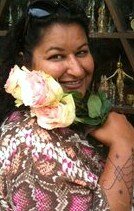Service and Faith: Saumya Haas
Today’s post reaches back into the archives for Saumya Haas’ post on how her faith supports her service. Saumya is Executive Director of Headwaters/Delta Interfaith.
There is no way to agree on a definition of faith. We each have our own way of understanding. The same can be said for interfaith work. There are lots of ways, and many reasons.
When it comes to faith, I’m everything and nothing: a hereditary Hindu Pujarin, a Unitarian Reverend, and Manbo Asogwe (Priestess of Vodou). I celebrate Christmas and Winter Solstice. I am a religious humanist. I believe in science. I’m not an authority on anything, but I am irrepressibly curious; I question my motives, effectiveness and reason every day. I’m also the Director of Headwaters/Delta Interfaith: this secular organization exists because of my definition of faith.
I was raised with the idea that certainty is suspect: critical assessment, empathy and debate are necessary vehicles of a faith life. These are also the qualities that advised my family’s deep commitment to interfaith outreach, spiritual education and social equity work. Of course we didn’t use those terms. It was just what we did. I went into the slums and helped. I never failed to notice that the kids I played with and helped during the day didn’t leave at the end of it. This was their real life.
Those slums taught me. I worked with Hindus, Muslims, Sikhs, Christians and people who practice tribal and folk tradition, with ethnic and cultural groups whose rivalries and divisions make religious differences look like nothing. These groups were made up of sub-groups, of sub-sub-groups. Of individuals. I didn’t know I was an interfaith facilitator. I always felt I was the one learning. I still do.
Today, I live in the USA and my organization, Headwaters/Delta Interfaith, does a variety of things: we are very involved with revitalization efforts in New Orleans, where we are opening a non-denominational Spiritual Space as part of the innovative New Orleans Healing Center. We work with Hindu American Seva Charities to unite Hindu communities across the USA in social service outreach projects, and assist the Pluralism Project at Harvard University with documenting faith diversity. We also provide Social Media advice to other organizations and facilitate events that bring people together in mutual respect and curiosity. We still help the diverse populations in Indian slums by supporting the work of , the organization my parents started, where I discovered what faith, and interfaith could mean.
I learned that if you want to help people, you have to realize that they have a real life, not a life that you imagine or superimpose due to their faith/ethnicity/whatever. They are whole. Our burden is not to help them, but to unburden ourselves of certainty. Both faith and interfaith work require a struggle with our own egos. When I walk into a meeting, a slum, a church, a classroom, I have to remind myself: these people know more than I do. They are authorities on their own lives. I am an authority on mine. That is all.
I struggle with my attachment to results: I want to see the manifestation of my work. Changing societies is the tedious work of generations, of ages. It is happening all the time, but we don’t know how our own contribution will turn out. We can see our failures but it’s never given to us to know what we averted. We cannot measure the impact of things that do not happen: the lives saved, the neighborhoods preserved, the connections that caught and held the world together. We only notice the violence and the loss. The gain is invisibly hidden in the everyday. The proof of its existence is that there is nothing to see. I’m not talking about God; I’m talking about goodness. I’m talking about us.
As an expression of my faith, interfaith work becomes my faith.
I have questions about God that may never be answered, but I’m certain that other people are as real as I am. If God is real he/she/it is encoded by the reality I can see: it is that reality that I engage with. If God is within, then my urge to engage, to speak out against injustice, is also God. But in the end, my faith is most deeply in my fellow humans: in the wisdom of our combined cultures, unique heritage and the spark that gives us curiosity and compassion.
We each might have our own answer, but we seek them together.
 Saumya Arya Haas, Executive Director of Headwaters/Delta Interfaith, advises local, national and international inter/faith and social equity organizations. She is a Hindu Pujarin, Unitarian Reverend and Manbo Asogwe (Priestess of Vodou); she blogs about religion at The Huffington Post and around the web.
Saumya Arya Haas, Executive Director of Headwaters/Delta Interfaith, advises local, national and international inter/faith and social equity organizations. She is a Hindu Pujarin, Unitarian Reverend and Manbo Asogwe (Priestess of Vodou); she blogs about religion at The Huffington Post and around the web.


